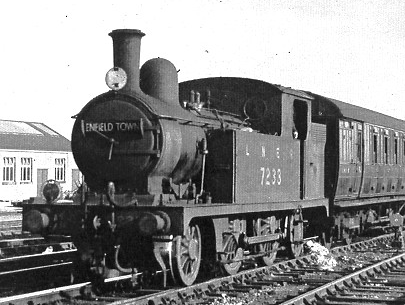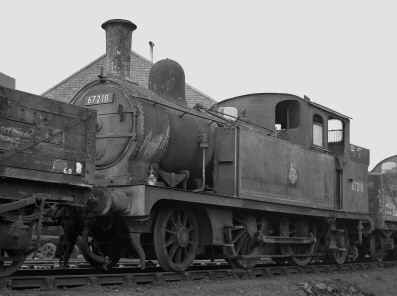The T.W.Worsdell F4 and F5 (GER Class M15) 2-4-2T Locomotives

The F4 and F5 2-4-2T tank locomotives had a mixed history. T.W.Worsdell introduced the 2-4-2T type to the Great Eastern Railway (GER) in 1884 from his previous employer, the London & North Western Railway (LNWR). These GER Class M15 (LNER F4) locomotives were designed for working branch and suburban passenger services. Known as "Gobblers" due to their excessive fuel consumption, they were not a great success and many were withdrawn before Grouping in 1923.
T.W.Worsdell's successor, James Holden designed and built the J66, J67, and G4 tank locomotives for similar branch work, but reverted to the M15/F4 design in 1903. These new locomotives were built with Stephenson valve gear instead of the Joy valve gear, to solve the excessive fuel consumption problems. A total of 160 GER Class M15 (LNER Class F4) locomotives were built between 1884 and 1909. Thirty of the M15 locomotives were rebuilt between 1911 and 1920 with higher pressure boilers to become LNER Class F5.
Most of the F4s and F5s spent their lives working the London suburban services, until being replaced by N7s. They then hauled services throughout East Anglia, although three F4s were moved to Scotland in the 1930s. When working the Fraserburgh to St. Combs branch, these would be fitted with cowcatchers. Two of these were fitted for push-pull working in 1941, using the standard LNER vacuum push-pull gear.

Many of the F4s and F5s were fitted with condensing gear for working the East London line and the approaches to Liverpool Street. Most of the condensers were removed by the LNER between 1936 and 1937, but a few F5s survived into BR ownership with their condensing gear for use on the East London line.
Between 1940 and 1943, fifteen F4s and one F5 were loaned to the military for hauling armoured coastal defence units. These were allocated to various towns all the way from Canterbury to Aberdeen.

With withdrawals of the original T.W.Worsdell M15s starting in 1913, only 118 F4s and 30 F5s entered LNER ownership at Grouping in 1923. The LNER quickly withdrew the remaining F4s built during T.W.Worsdell's tenure. With the withdrawal of the last of these in 1929, a start was made on the James Holden / S.D.Holden F4s. The last F4 was withdrawn in 1956. The F5s lasted longer but were quickly withdrawn between 1955 and 1958.
Technical Details
| F4 | F5 | ||
| Cylinders (x2): | 17.5x24in. | 17.5x24in. | |
| Motion: | Stephenson | slide valves | slide valves |
| Boiler: | Max. Diameter: | 4ft 2in | 4ft 2in |
| Pressure: | 160psi | 180psi | |
| Diagram No.: | 33 | 34 | |
| Heating Surface: | Total: | 1116.4 sq.ft. | 1114.7 sq.ft. |
| Firebox: | 98.4 sq.ft. | 96.7 sq.ft. | |
| Tubes: | 1018.0 sq.ft. (227x 1.625in) | 1018.0 sq.ft. (227x 1.625in) | |
| Grate Area: | 15.3 sq.ft. | 15.2 sq.ft. | |
| Wheels: | Leading: | 3ft 9in | 3ft 9in |
| Coupled: | 5ft 4in | 5ft 4in | |
| Trailing: | 3ft 9in | 3ft 9in | |
| Tractive Effort: | (@ 85% boiler pressure) | 15,618lb | 17,571lb |
| Total Wheelbase: | 23ft | 23ft | |
| Engine Weight: | (full) | 51 tons 11cwt | 53 tons 19cwt |
| Max. Axle Load: | 14 tons 18cwt | 16 tons | |
| Coal Capacity: | 3 tons 10cwt | 3 tons 10cwt | |
| Water Capacity: | 1200 gallons | 1200 gallons |
Preservation
The last F4 was withdrawn in 1956 and the last F5 was withdrawn in 1958. Neither class survived into preservation, but the Holden F5 Steam Locomotive Trust plans to build a working replica from the original drawings.
Models
Finney and Smith produce 3mm scale kits of the F4 and F5.
Both Falcon Brassworks and Alan Gibson sell 4mm scale kits of both the F4 and F5. Both Stephen Poole and Nu-Cast have produced 4mm scale kits of ust the F4. The Stephen Poole kit is no longer available.
Connoisseur Models sell a kit of the F5 for 7mm scale (O gauge).
Acknowledgements
Thank you to the P.H. Groom collection for permission to use the above photograph of F5 BR No. 67195.
Thank you to Malcolm Peirson for the photograph of F4 No. 7233.
Thank you to the Mike Morant Collection for the photograph of F5 No. 67218.